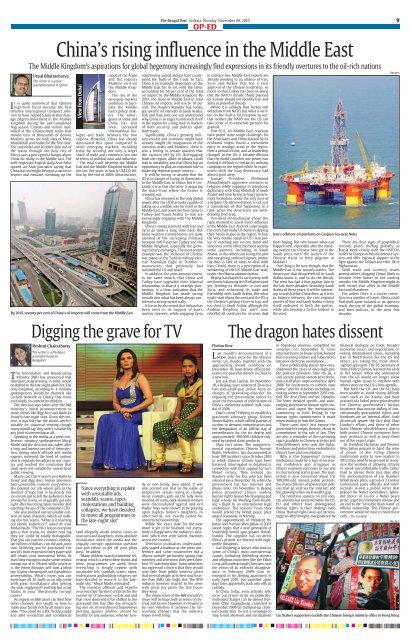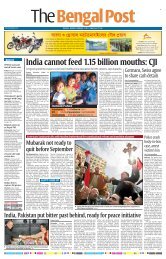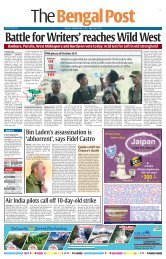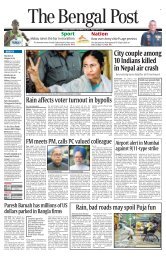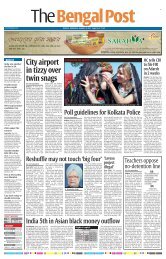29_page01-city final_Layout 1
29_page01-city final_Layout 1
29_page01-city final_Layout 1
You also want an ePaper? Increase the reach of your titles
YUMPU automatically turns print PDFs into web optimized ePapers that Google loves.
It is quite symbolical that Chinese<br />
high-tech trains became the first<br />
effective international transport solution<br />
to have helped Saudi Arabia manage<br />
pilgrim movement in the Arabian<br />
Kingdom during the just-completed<br />
Hajj season. Citizens and visitors marvelled<br />
at the Chinese-built trains that<br />
moved tens of thousands of devout<br />
Muslims across the holy sites of Mina,<br />
Muzdalifah and Arafat for the first time.<br />
The successful and accident-free run of<br />
the trains through the holy <strong>city</strong> of<br />
Mecca was a perception-changer about<br />
China for many in the Middle East. The<br />
well-respected English daily Arab News<br />
quoted an Arab journalist saying that<br />
China has overnight become a nation to<br />
respect and emulate, summing up the<br />
mood of the Arabs<br />
and the region’s<br />
Muslims vis-à-vis<br />
the Middle King -<br />
dom.<br />
The rise of the<br />
emerging markets<br />
continues to fascinate<br />
the Middle<br />
East’s policy makers.<br />
The emergence<br />
of India and<br />
China has also<br />
seen increased<br />
international dialogue<br />
and trade between the two<br />
regions. However, China has clearly<br />
dominated this space compared to<br />
other emerging markets, including<br />
India, by securing not only a larger<br />
share of trade and commerce, but also<br />
in terms of political clout and influence.<br />
The total trade between the Middle<br />
East and the Middle Kingdom tripled in<br />
the last five years to nearly US$110 billion<br />
by the end of 2009. Infrastructure,<br />
Reuters<br />
The Bengal Post Kolkata Monday November <strong>29</strong>, 2010<br />
OP-ED<br />
China’s rising influence in the Middle East<br />
The Middle Kingdom’s aspirations for global hegemony increasingly find expressions in its friendly overtures to the oil-rich nations<br />
Utpal Bhattacharya<br />
The writer is a senior<br />
journalist based in Dubai<br />
View from Dubai<br />
By 2015, seventy per cent of China’s oil imports will come from the Middle East<br />
engineering and oil and gas have constituted<br />
the bulk of this trade. In fact,<br />
China is increasingly dependent on the<br />
Middle East for its oil, with the latter<br />
accounting for 58 per cent of the total<br />
oil import to the Middle Kingdom. By<br />
2015, the share of Middle East in total<br />
Chinese oil imports will rise to 70 per<br />
cent. The People’s Republic has, today,<br />
got specific oil interests in Saudi Arabia,<br />
Iran and Iraq, and, one can understand<br />
why China is so eager to entrench itself<br />
in the region for a long haul in matters<br />
of both security and politics apart<br />
from trade.<br />
Significantly, China’s growing military<br />
muscle and economic might have<br />
already caught the imagination of the<br />
common Arabs and Muslims; there is<br />
also a feeling in certain quarters that<br />
the vacuum left by US’ disengaging<br />
from the region, albeit in phases, could<br />
lead to instability, and that China has an<br />
opportunity to play an important role in<br />
balancing regional power centres.<br />
It will be wrong to assume that the<br />
US is in danger of losing its dominance<br />
in the Middle East to China, but it certainly<br />
is true that the latter is acquiring<br />
the space from where the former is<br />
creeping out.<br />
China has emerged as the only global<br />
power after the US that looks capable of<br />
taking up a credible role for itself in the<br />
Middle East, and countries from Syria to<br />
Turkey and Saudi Arabia to Iran are<br />
increasingly engaging with the Middle<br />
Kingdom.<br />
China’s strong relations with Iran and<br />
Syria go quite a long time back. But<br />
some western commentators are quite<br />
alarmed at the increasing intimacy<br />
between NATO partner Turkey and the<br />
Middle Kingdom, especially the growing<br />
military exchanges. The most recent<br />
example was the inclusion of Chinese<br />
war planes in the Turkish military exercise<br />
Anatolian Eagle in October —<br />
manoeuvres that previously had<br />
included the US and Israel.<br />
In addition, the joint announcement,<br />
in the same month, that China and<br />
Turkey have upgraded their bilateral<br />
relationship to that of a strategic partnership,<br />
is a clear indication that the<br />
Middle Kingdom has made strong<br />
inroads into what has been always considered<br />
a strong western ally.<br />
It has to be also noted that Ankara has<br />
been overt in its support of Iran’s<br />
nuclear interests, while engaging Syria<br />
Digging the grave for TV<br />
Reshmi Chakraborty<br />
The writer is a freelance<br />
journalist based in<br />
Bangalore<br />
The Information and Broadcasting<br />
Ministry (I&B) has announced that<br />
television programming in India would<br />
be shifted to the late-night adult slot. The<br />
only exception, according to a ministry<br />
spokesperson, would be channels like<br />
Cartoon Network or Disney that focus<br />
exclusively on content for children.<br />
The decision was taken after the I&B<br />
ministry’s initial pronouncement to<br />
move shows like Bigg Boss and Rakhi ka<br />
Insaaf to late-night slots. Given the content,<br />
it was felt that the shows weren’t<br />
suitable for universal viewing though<br />
many would say they aren’t suitable for<br />
any kind of viewership at all.<br />
Speaking to the media at a press conference,<br />
ministry spokesperson Moral<br />
Mashi said the decision was taken after<br />
a long and intense period of introspection,<br />
during which officials and media<br />
experts reviewed the kind of content<br />
that is regularly broadcast in our country<br />
and reached the conclusion that<br />
most were not suitable for unrestricted<br />
public viewing.<br />
Mashi said that it wasn’t just Rakhi ka<br />
Insaaf and Bigg Boss, Indian television<br />
had unsuitable content everywhere.<br />
She pointed out ads where girls in the<br />
shortest of tops had to lusciously lick<br />
ice-cream just to tell the audiences how<br />
wonderful it was, or magically got jobs<br />
right after becoming fairer, lovelier and<br />
catching the eye of the company’s CEO.<br />
She also pointed out unsuitable content<br />
on news channels, which air nothing<br />
else but scams. “What is it teaching<br />
our family audiences?” asked an irate<br />
Moral Mashi. “The No.1 lesson everyone<br />
gets is that scams, no matter how big<br />
they are, could be totally manageable.<br />
That you can cost the country’s exchequer<br />
billions of dollars, con the aam junta<br />
into believing you’ve purchased the<br />
world’s most expensive toilet paper and<br />
still retain your ministerial berth. At<br />
least long enough to make some serious<br />
money out of it. Oh and while you’re at<br />
it, the Prime Minister will turn a blind<br />
eye to your shenanigans until goaded to<br />
answerability. What’s more, you can<br />
even bare all 32 teeth in an oily smile<br />
with great nonchalance after getting<br />
the sack, implying it’s nothing but a tiny<br />
hiatus in your illustriously corrupt<br />
career.”<br />
An expert on I&B panel clarified how<br />
news channels also taught us how to<br />
make your family rich by all means possible.<br />
“You could do a B.S. Yeddyurappa<br />
and allot residential and commercial<br />
‘Since everything is replete<br />
with unsuitable ads,<br />
scandals, scams, rapes,<br />
molestations and building<br />
collapses, we have decided<br />
to move all programmes to<br />
the late-night slot’<br />
land allegedly worth several crores to<br />
your sons and daughters, show absolute<br />
insouciance when the media and the<br />
(equally corrupt) opposition question<br />
you and refuse to get off your plum<br />
post,” he added.<br />
“Many children watch primetime television<br />
which is when these shows and<br />
news programmes are aired. Since<br />
everything is simply replete with<br />
unsuitable ads, scandals, scams, rapes,<br />
molestations and building collapses, we<br />
have decided to move it to the latenight<br />
slot,” Moral Mashi reiterated.<br />
The ministry officials and experts<br />
reserved their harshest criticism for the<br />
current lot of television serials and said<br />
that most deserved to be shifted to the<br />
graveyard slot. Day after day of watching<br />
one set of overdressed housewives<br />
plotting against another cannot be<br />
healthy for any audience, whether fam-<br />
ily or non-family, they added. It was<br />
also pointed out that in the name of<br />
progressive serials trying to change<br />
social customs, girls on the telly were<br />
married off early, dark-skinned women<br />
were discriminated against and evil<br />
thakur boys were shown to be preying<br />
upon hapless farmer’s daughters. In<br />
other words, not exactly suited for<br />
unrestricted viewership.<br />
While the exact date for the new<br />
move is yet to be <strong>final</strong>ised, not everybody<br />
is happy with the ministry’s decision,<br />
which met with varied reactions<br />
across the country.<br />
Television journalists understandably<br />
staged a walkout at the press conference<br />
and some housewives did a<br />
dharna outside parliament saying that<br />
morning and afternoon slots were their<br />
best TV-watching time. Some ministers<br />
too expressed concern that they would<br />
now fade from public memory given<br />
that several people go to bed much earlier<br />
than I&B’s late night slot. The BPO<br />
industry however reacted to the news<br />
with great joy given the late hours<br />
they keep.<br />
The implication of the I&B ministry’s<br />
move will be huge, both in terms of revenue<br />
and leisure. However, it remains to<br />
be seen whether it achieves the farreaching<br />
changes that the ministry<br />
hopes it will bring.<br />
in military ties. Middle East experts are<br />
already pointing to an alliance of Iran,<br />
Syria and Turkey that has a tacit<br />
approval of the Chinese leadership; so<br />
much so that Turkey has been insisting<br />
that the NATO’s missile shield planned<br />
for Europe should not identify Iran and<br />
Syria as potential threats.<br />
While it is unlikely that Turkey will<br />
withdraw from NATO, but what is written<br />
on the wall is for everyone to see:<br />
that neither the NATO nor the US can<br />
take some of its erstwhile partners for<br />
granted.<br />
Post-9/11, US-Middle East relations<br />
have posed some tough challenges for<br />
the Americans, and China, backed by its<br />
economic might, found a convenient<br />
entry in strategic areas in the region.<br />
Over a period of time, and, as leadership<br />
changed in the US, it became obvious<br />
that the world’s number one power was<br />
finding it difficult to sustain its military<br />
campaign in the region, while its experiment<br />
with the Iraqi democracy had<br />
almost gone awry.<br />
Iranian President Mohmoud<br />
Ahmadinejad’s aggressive overtures in<br />
Lebanon while engaging in telephonic<br />
diplomacy with King Abdullah of Saudi<br />
Arabia and interfering in Iraq’s government<br />
formation, under the very nose of<br />
a helpless US administration, is not just<br />
a coincidence of that happening at a<br />
time when the Americans are withdrawing<br />
from Iraq.<br />
President Ahmadinejad chose the<br />
right moment to assert Iran’s influence<br />
in the Middle East. And not surprisingly,<br />
the event had many US-baiters clapping<br />
their hands in glee in the region. In fact,<br />
the very double speak in US’s Iran policy<br />
of reaching out on one hand and<br />
sanctions on the other, has been seen by<br />
some quarters, including in Saudi<br />
Arabia, as the Americans losing the plot<br />
and one giving confused signals, primarily<br />
due to lack of ideas to deal with<br />
Iran. Clearly, there is a perception of a<br />
weakening of the US’ Middle East hold,<br />
under the Obama administration.<br />
Beijing has played its card pretty well<br />
until now, balancing its US relations and<br />
yet, lending its shoulder to Iran and<br />
Syria, and enhancing its trade and<br />
friendship with Saudi Arabia. But what<br />
might start irking the west and the US is<br />
the Chinese’s getting closer to Iraq and<br />
too close to Saudi Arabia, although the<br />
Arabian Kingdom has, until now,<br />
rebuffed all overtures for an arms deal<br />
Iran’s offshore oil platform on Caspian Sea near Neka<br />
from Beijing. But who knows what can<br />
happen next, especially after the standing<br />
ovation the Chinese have got in the<br />
Saudi press with the launch of the<br />
Chinese trains to ferry pilgrims in<br />
Makkah?<br />
One thing is for sure, though, that the<br />
Middle East is not smooth waters. The<br />
Americans that discovered oil in Saudi<br />
Arabia know it, and so do the British.<br />
The west has had a bias against Iran in<br />
the last three decades, favouring Saudi<br />
Arabia all these years. It will be interesting<br />
to watch what China does, as it tries<br />
to balance between the two regional<br />
powers of Iran and Saudi Arabia to keep<br />
itself endeared to both the parties,<br />
while also keeping a furtive lookout to<br />
the west.<br />
9<br />
Reuters<br />
There are clear signs of geopolitical<br />
tectonic plates shifting globally, as<br />
Russia work closely with the NATO to<br />
build the European missile defence system<br />
and offer logistical support in the<br />
fight against the Taliban and their ilk in<br />
Afghanistan.<br />
With trade and currency issues<br />
among others (dogging China) likely to<br />
become even hotter in the coming<br />
months, the Middle Kingdom might as<br />
well secure true allies in the Middle<br />
East and elsewhere.<br />
For, unless there is a course correction<br />
on a number of issues, China could<br />
find itself quite isolated in its quest to<br />
reach the top of the global economy,<br />
and thus politics, in the next few<br />
decades.<br />
The dragon hates dissent<br />
Phelim Kine<br />
Last month’s announcement of a<br />
Nobel peace prize for the Chinese<br />
writer Liu Xiaobo, together with the<br />
approaching award ceremony on<br />
December 10, have driven official tolerance<br />
for peaceful dissent in China to<br />
a new low.<br />
Just ask Zhao Lianhai. On November<br />
10, a Beijing court sentenced Zhao to a<br />
two-and-a-half-year prison term on<br />
charges of ‘provoking disorder’ for<br />
exposing the government failure to<br />
assist the thousands of child victims of<br />
China’s melamine-tainted milk scandal<br />
of 2008.<br />
Zhao’s crime? Helping to establish a<br />
grassroots advocacy group, Kidney<br />
Stones Babies, which rallied parents of<br />
victims to demand compensation and<br />
the designation of an official day of<br />
remembrance for the six deaths and<br />
approximately 300,000 children sickened<br />
by tainted dairy products.<br />
Zhao isn’t alone. The nongovernmental<br />
organization Chinese Human<br />
Rights Defenders has documented at<br />
least 100 incidents since October 2010<br />
in which Chinese citizens have been<br />
harassed, interrogated or detained in<br />
connection with their support for Liu’s<br />
Nobel victory. They include Liu<br />
Xiaobo’s wife, Liu Xia, who has been<br />
silenced since November 18, when the<br />
government cut her internet and<br />
phone links. On November 9, Beijing<br />
police prevented China’s leading<br />
human rights lawyer Mo Shaoping and<br />
legal scholar He Weifang from boarding<br />
a flight to an international legal<br />
conference. The reason? Fears they<br />
would attend the Nobel peace prize<br />
award ceremony in Norway.<br />
The appointments of President Hu<br />
Jintao and Premier Wen Jiabao in 2003<br />
raised hopes that a new generation of<br />
leadership would spur greater liberalization.<br />
The opposite has occurred.<br />
China’s prisons are littered with highprofile<br />
dissidents.<br />
Gao Zhisheng, a lawyer who took on<br />
some of China’s most controversial<br />
causes, including defending miners<br />
and religious minorities like the Falun<br />
Gong and underground Christians, was<br />
the victim of an enforced disappearance<br />
in February 2009. Gao reemerged<br />
in his Beijing apartment in<br />
early April 2010, but vanished again<br />
days later, apparently back into official<br />
custody.<br />
In China today, even activists who<br />
serve out prison terms on politicallymotivated<br />
charges can be denied freedom.<br />
Chen Guangcheng, convicted in<br />
December 2006 on trumped-up criminal<br />
counts after he led a campaign to<br />
stop forced abortions and sterilizations<br />
in Shandong province, completed his<br />
sentence on September 9. Chen<br />
returned home to house arrest, banned<br />
from receiving visitors and subjected to<br />
intrusive electronic surveillance.<br />
These proliferating abuses have overshadowed<br />
the cases of once-high-profile<br />
political prisoners. Take Hu Jia, a<br />
civil society activist sentenced to threeand-a-half<br />
years’ imprisonment in April<br />
2008 for ‘incitement to subvert state<br />
power’ and for activities including cowriting<br />
a letter in September 2007 entitled<br />
The Real China and the Olympics.<br />
The letter detailed specific and wideranging<br />
government human rights violations<br />
and urged the international<br />
community to hold Beijing to the<br />
human rights commitments it made<br />
when bidding to host the Games.<br />
These cases don’t just expose the<br />
government’s empty rhetoric about its<br />
commitment to the rule of law. They<br />
are also a reminder of the narrowing<br />
space available to Chinese activists and<br />
whistleblowers who seek the rights,<br />
freedoms and protections embodied in<br />
China's laws and constitution.<br />
Why is this happening? Growing<br />
intolerance could be a sign of increasing<br />
confidence and arrogance as<br />
China’s economy continues to roar and<br />
its international status grows. The leadership<br />
is also concerned about the<br />
100,000-odd annual public protests,<br />
the sharp criticism of government policies<br />
that go viral via the internet, and<br />
the growing urban-rural wealth gap.<br />
The relentless squeeze on civil society<br />
activists has occurred while the US,<br />
EU and others have downgraded<br />
human rights in their dealings with<br />
China. Human right issues are increasingly<br />
an afterthought, marginalized by<br />
bilateral dialogue on trade, broader<br />
economic issues, and negotiations on<br />
vexing international issues, including<br />
Iran or North Korea. But the US and<br />
others are taking the most shortsighted<br />
approach. The US Secretary of<br />
State, Hillary Clinton, learned this early<br />
in her tenure when she announced<br />
that the US would no longer allow<br />
human rights issues to interfere with<br />
other issues on the US-China agenda.<br />
But both the US and the EU have<br />
been unable to avoid raising difficult<br />
cases such as Liu Xiaobo and have<br />
praised Liu’s Nobel peace prize despite<br />
the Chinese government's furious<br />
insistence that routine stifling of constitutionally-guaranteed<br />
rights and<br />
freedoms are an ‘internal affair’. Such<br />
dismissals ignore the fact that Zhao<br />
Lianhai’s efforts, and those of other<br />
brave Chinese whistleblowers, aim to<br />
both protect Chinese consumers from<br />
toxic products as well as keep them<br />
out of the export chain<br />
As President Hu Jintao and Premier<br />
Wen Jiabao prepare to hand the reins<br />
of power of the ruling Chinese<br />
Communist party to new leaders in<br />
2012, they need to be pressed to recognize<br />
the wisdom of allowing citizens<br />
to speak uncomfortable truths rather<br />
than to silence them. Just days after<br />
the announcement of Liu Xiaobo’s<br />
Nobel peace prize, a group of 23 senior<br />
Communist party officials and intellectuals<br />
issued a public letter that<br />
praised the Nobel committee’s ‘splendid<br />
choice’ of Liu for a Nobel peace<br />
prize, urged his immediate release and<br />
an end to the "invisible black hand" of<br />
official censorship. The Chinese government<br />
would be wise to heed these<br />
calls. —The Guardian<br />
Reuters<br />
Liu Xiabo’s supporters outside the Chinese foreign ministry office in Hong Kong


